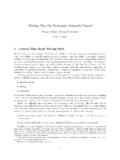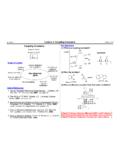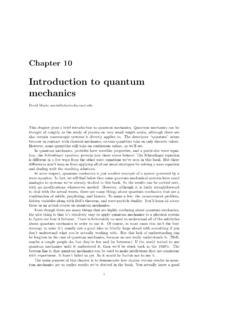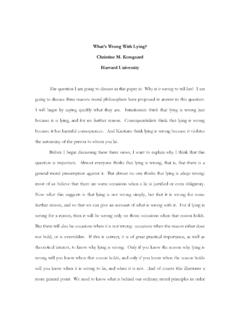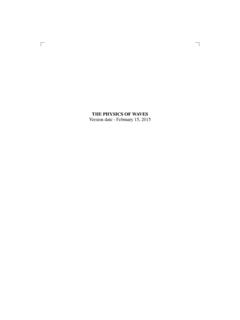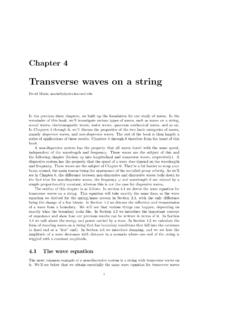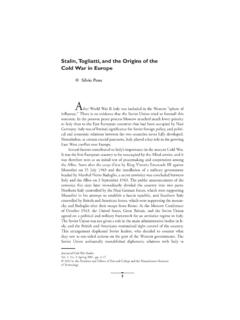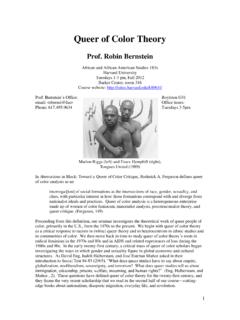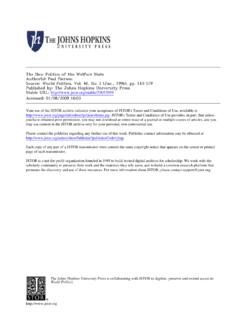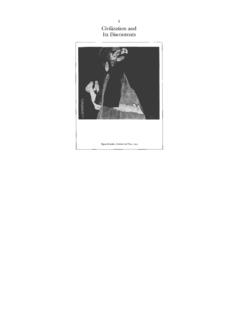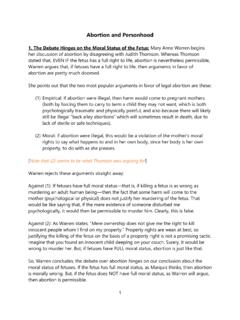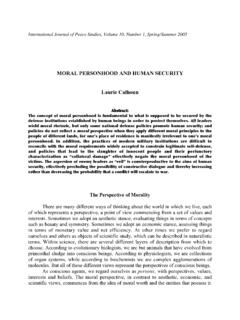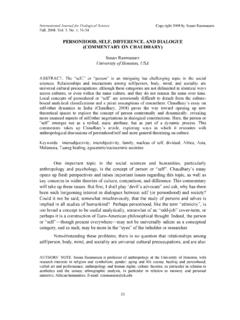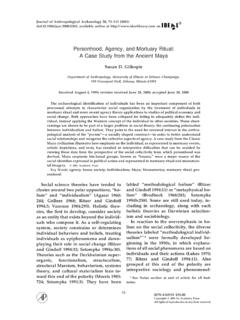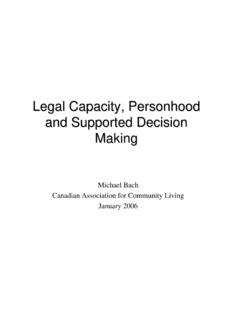Transcription of Christine M. Korsgaard - Harvard University
1 personhood , Animals, and the Law Christine M. Korsgaard The idea that all the entities in the world may be, for legal and moral purposes, divided into the two categories of persons and things comes down to us from the tradition of Roman law. In the law, a person is essentially the subject of rights and obligations, while a thing may be owned as property. In ethics, a person is an object of respect, to be valued for her own sake, and never to be used as a mere means to an end, while a thing has only a derivative value, and may be used as a means to some person s ends. This bifurcation is unfortunate because it seems to leave us with no alternative but to categorize everything as either a person or a thing. Yet some of the entities that give rise to the most vexing ethical problems are exactly the ones that do not seem to fit comfortably into either category.
2 For various, different, kinds of reasons, it seems inappropriate to categorize a fetus, a non-human animal, the environment, or an object of great beauty, as a person, but neither does it seem right to say of such things that they are to be valued only as means. In the law, the bifurcation between persons and things or persons and property leaves non-human animals in an especially awkward position. Animals, or at least many of them, are sentient beings with lives of their own and capacities for enjoyment and suffering that seem to make some sort of claim on us. Some have very sophisticated cognitive capacities, including some sense of self. But because animals are classified as property, efforts to secure them some legal protections have personhood , Animals, and the Law Christine M. Korsgaard p. 2 been of mixed success and have introduced a certain level of incoherence into the laws.
3 In the face of this, some animal rights advocates have suggested that all cognitively sophisticated animals, or all animals generally, ought to be re-categorized as legal persons. But it may be argued that those who make this proposal are ignoring something important about the concept of a person. It has generally been assumed that personhood , whatever it is, is, or is based on, an attribute that is characteristic of human beings, and not of the other animals. In the philosophical tradition, the most common candidate for the attribute that establishes personhood is rationality, but understood in a specific sense. Rationality is sometimes loosely identified with the ability to choose intelligently between options or to solve problems by taking thought, but those are attributes that human beings arguably share with many other animals.
4 The more specific sense of rationality refers to a normative capacity, a capacity to assess the grounds of our beliefs and actions, and to adjust them accordingly. On the side of action, for instance, it is the capacity to ask whether something that would potentially motivate you to perform a certain action is really a reason for doing that action and then to be motivated to act in accordance with the answer that you get. Rationality, in this sense, is normative self-government, the capacity to be governed by thoughts about what you ought to do or to believe. In fact, even some thinkers who would deny that rationality is the distinctive characteristic of humanity would still agree that normative self-government is both definitive of personhood and distinctive of humanity. In the empiricist tradition, the personhood , Animals, and the Law Christine M.
5 Korsgaard p. 3 tradition of Locke, Hume, and Hutcheson, it has been common to attribute to human beings, and human beings alone, a capacity to form so-called second-order attitudes for instance, attitudes towards our own desires that make them liable to normative assessment. Though I may desire to do something, I may also disapprove of that desire, and reject its influence over me. According to empiricists, second-order attitudes are what make human beings subject to an ought. So many philosophers have agreed that it is in virtue of normative self-government that human beings count as persons in the legal and moral sense. Certainly, if something along these lines is correct, it is natural to think that only human beings can have obligations. In order to have obligations, you need to be able to think about whether what you are doing is right, and to adjust your conduct accordingly.
6 This requires a highly developed theory of mind, as ethologists call it. An animal has a theory of mind when the animal knows that animals (herself included) have mental attitudes, such as beliefs and desires. But in order to be rational in the sense I just described, an animal must not only know that she and other animals have mental attitudes. She must also know that her attitudes are connected in certain ways for instance, that she is inclined to perform a certain action because she has a certain desire. To ask whether you have a good reason for doing what you propose to do, or whether it is right, is to think about and evaluate that connection, and it seems likely that only human beings can do that. But it is a much harder question whether being rational in this sense is necessary for having rights, and that is the question most pressing from the point of personhood , Animals, and the Law Christine M.
7 Korsgaard p. 4 view of those who seek legal protections for animals. The traditional distinction between persons and things groups the ability to have rights and the liability to having obligations together. One common view about why that should be so is that rights are grounded in some sort of agreement that is reciprocal: I agree to respect certain claims of yours, provided that you respect certain similar claims of mine. The view of society as based on a kind of social contract supports such a conception of rights. But in fact our laws do not merely protect those who as citizens are involved in making its laws: rather, they protect anyone who shares the interests that the laws were made to protect. So for instance, foreigners on our soil have rights not to be robbed or murdered, regardless of the fact that they are not parties to our own social contract.
8 The laws that we make against murder and robbery are intended to protect certain human interests that foreigners share with citizens, and that is sufficient to give them the relevant rights. Of course, foreigners on our soil can also be made to conform to our laws reciprocity can be required of them. But when we speak of universal human rights, we speak of interests that are shared by every human being and that we think ought to be protected, not merely of the interests protected under some actual social contract. So it makes sense to raise the question whether the other animals share the kinds of interests that our laws either legal or moral are meant to protect. Animal rights advocates urge that the other animals, like human beings, do have interests. Let me do a little philosophizing about why this is so. Animals have interests because of the way in which things can be good or bad for them.
9 Generally personhood , Animals, and the Law Christine M. Korsgaard p. 5 speaking, we use the concepts of good-for and bad-for when we regard objects functionally. Something is good for an object when it enables the object to function well, and bad for it when it interferes with its ability to function. So we might say that riding the brakes is bad for your car, while a regular oil change is good for it. Organisms may be regarded as functional objects, designed by the evolutionary process to survive and reproduce. We are thinking of things that way when we say that plenty of water and sunshine are good for the plants. Because a car is an artifact made for human purposes, the ways in which things are good or bad for the car are derivative from human interests. But the way in which things are good or bad for organisms is non-derivative: things are good or bad for the organisms themselves.
10 What is distinctive of animal life is the way that it functions, which is by means of perception and action. Through perception, an animal forms some sort of representation of her environment. As a result of instinct, learning, and in the case of some animals, intelligent thought, objects in the animal s environment are represented as desirable or aversive in specific ways: as something to eat, or to flee from, or to mate with, or to take care of. Or some sort of practical representation may arise from within, as when you get hungry and find yourself irresistibly thinking about a sandwich. The animal then acts in accordance with these practical representations. The practical representations serve, though very imperfectly of course, to enable an animal to get what is good for her and avoid what is bad for her.
